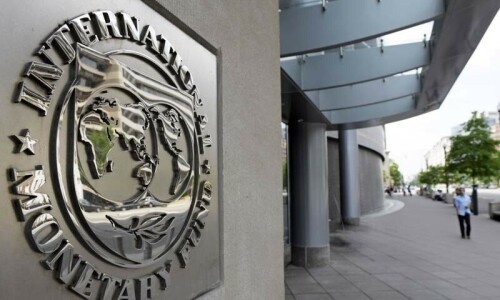ROME, March 3: World food prices have hit record highs and oil price spikes could push them even higher, the UN food agency warned on Thursday, as increasing violence in Libya sent jitters through commodity markets. The Food Price Index, which monitors average monthly price changes for a variety of key staples, rose to 236 points in February from 231 points in January, the UN's Food and Agriculture Organisation (FAO) said.
It was the highest level since FAO began monitoring prices in 1990.
“Unexpected oil price spikes could further exacerbate an already precarious situation in food markets,” David Hallam, director of the Rome-based FAO's trade and market division, was quoted as saying in a statement.
“This adds even more uncertainty concerning the price outlook just as plantings for crops in some of the major growing regions are about to start.”
FAO economists warned that food prices were likely to remain high until the outlook for this year's harvests is known by around April.
Crude prices dipped on Thursday after pushing higher in nervous trading amid fighting in oil-rich Libya.
Brent North Sea crude for delivery in April fell 63 cents to $115.72 per barrel. New York's light sweet crude for April, known as West Texas Intermediate (WTI), shed 61 cents to $101.61.
Prices jumped on Wednesday by nearly three dollars in New York.
“Persistent uncertainty in the region continues to support fears of contagion,” British bank Barclays Capital said in a report.
“Lost output from countries like Libya and the increasing likelihood of a pushback in foreign investment is set to support longer-term prices,” it said.
Analysts at Germany's Commerzbank warned: “There is still a risk of the unrest spreading to other oil producing countries of the region.” The International Energy Agency said oil exports from Libya had been cut by between 850,000 and one million barrels per day, out of a total of 1.6 million barrels sent mostly to European buyers before the uprising.
Loyalist attacks on the strategic Libyan oil port of Brega, home to major petroleum operations, added to concern, while popular unrest also affects the Arabian Peninsula with protests in Bahrain, Oman and Yemen.
Higher oil prices affect all aspects of the food production chain, from fertiliser to transport.
The FAO has warned that rising food prices are in turn driving unrest around the world, including recent uprisings in the Middle East and North Africa.
Aid agencies have called on the international community to take urgent action to put an end to the recent food price volatility.
The G20 group of leading world economies has vowed to take action.
The FAO said the February increase in its Food Price Index was the eighth consecutive monthly rise, with dairy prices up 4.0 per cent from January and cereal prices up 3.7 per cent due to increased maize demand and lower supply.
The UN food agency said that this was due to “larger use of maize for ethanol production in the United States” and “statistical adjustments to China's historical supply and demand balance for maize.”
Meat prices meanwhile rose 2.0 per cent from January, while the price of oils and fats rose only marginally and sugar fell slightly.
A breakdown of Thursday's FAO data showed that in China prices for rice and wheat flour stabilised after government assurances on reserves but they remained 23 per cent and 16 per cent above their levels for February 2010.
The data also showed that coarse grain prices have started to increase in Africa, while in South America wheat and maize are also trending higher.
In the former Soviet Union, wheat prices stabilised or decreased.
IMF 'extremely concerned' The International Monetary Fund is worried about rising food prices, especially as they affect the poor and most vulnerable people, a spokeswoman said on Thursday.
“We're extremely concerned about rising food prices in particular because of their impact on the poorest and most vulnerable wherever they are, particularly in the low-income countries but not only there,” fund spokeswoman Caroline Atkinson said at a news briefing.
Asked how governments should address soaring food prices, which the United Nations reported on Thursday at record highs, Atkinson stressed the importance of “well-targeted” ways of supporting those most at risk.—AFP










































Dear visitor, the comments section is undergoing an overhaul and will return soon.